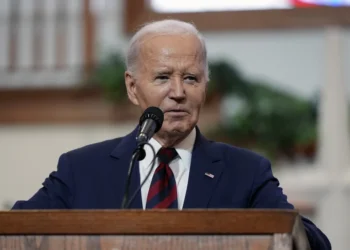While House Republicans’ major tax-cut bill contains hundreds of pages of policy changes, it also leaves out some key tax provisions that have been discussed over the past several months.
The House voted early Thursday to pass the $4 trillion budget reconciliation bill, 215 to 214. No Democrats joined Republicans in voting for the legislation, dubbed by President Donald Trump and Republicans the One Big Beautiful Bill Act. Crafting the bill took weeks of negotiations, which resulted in some high-profile measures being dropped.
Notably, while House Speaker Mike Johnson (R-LA) shepherded the legislation through the House, the Senate will now have the opportunity to revise it, meaning that some of the omissions could still end up inside the final bill that Trump would sign.
Changes to corporate rate
The headline corporate tax rate was slashed from 35% to 21% as part of the 2017 Tax Cuts and Jobs Act. Notably, most of the latest tax cuts relate to extending or making permanent many of the provisions in the 2017 tax cuts, which were set to expire in 2026.
But not the corporate tax rate. That reduction was made permanent, a move that economists say spurred much economic growth and helped prevent corporate “inversions,” when U.S. multinationals merge with smaller foreign companies to place the headquarters of the new combined company in tax havens.
On the campaign trail, Trump talked about cutting the headline corporate tax rate to 20% and endorsed reducing it from 21% to 15% solely for companies that make their products in America.
Lowering the corporate tax rate to 15% for all corporations would slash revenue by between $460 billion and $675 billion over the next decade, according to the Committee for a Responsible Federal Budget.
However, the final House legislation passed on Thursday morning through reconciliation did not include a lowered corporate tax rate.
Nor did the bill raise the corporate tax rate. That alternative, too, was considered by some Republicans to offset the revenue losses from extending some of the individual tax cuts and other proposed tax changes.
Carried interest
Another provision that didn’t make the final House version of the reconciliation legislation is the elimination of the so-called carried interest “loophole.”
Carried interest is a kind of income that some investment firms earn while managing investors’ money. It is taxed at the rates on investment income, but critics say it should be taxed at the higher rates that apply to labor income.
Raising taxes on carried interest was one of Trump’s priorities in crafting tax policy on Capitol Hill.
The White House unveiled its list of tax priorities earlier this year. Among them were eliminating taxes on tips, Social Security, and overtime pay, raising the state and local tax deduction cap, removing special tax breaks for billionaire sports team owners, introducing tax cuts for made-in-America products, and carried interest.
Supporters of the current tax treatment of carried interest argue that hiking taxes on carried interest would be arbitrary, slow economic growth, and deprive businesses of a source of investment.
Drew Maloney, president of the American Investment Council, said in a recent statement that private equity and private credit industries invest about $700 billion yearly in the economy and that private equity-backed companies employ 12 million workers.
House Ways and Means Committee Chairman Jason Smith (R-MO) told the Washington Examiner on Friday that there wasn’t enough Republican support to include changes to carried interest in reconciliation. Smith said he doesn’t expect it to be added in the Senate.
“Carried interest is something that had a lot of discussions over on the House side, and simply did not have the votes … that’s why it’s not in the bill that passed out of the House,” Smith said in a phone call.
Higher top marginal rate
Another tax change that wasn’t included in the reconciliation bill was increasing the top marginal tax rate.
Trump reportedly considered reverting the top individual rate for taxpayers earning over $2.5 million from 37% to 39.6%.
Some thought a small increase for the wealthiest taxpayers would help Republicans counter Democratic messaging that legislation was a giveaway for the wealthy.
But despite the White House toying with the idea, Trump recently posted on social media that Democrats might accuse him of raising taxes despite his promises to keep them low.
“The problem with even a ‘TINY’ tax increase for the RICH, which I and all others would graciously accept in order to help the lower and middle income workers, is that the Radical Left Democrat Lunatics would go around screaming, ‘Read my lips,’ the fabled Quote by George Bush the Elder that is said to have cost him the Election,” Trump said. “NO, Ross Perot cost him the Election! In any event, Republicans should probably not do it, but I’m OK if they do!!!”
Grover Norquist, founder of Americans for Tax Reform, told the Washington Examiner on Friday that the idea was a “stress test” that showed Republicans didn’t fold on their pledge not to raise taxes.
“So we locked in, the Republican Party said, ‘We are not raising rates, got that?’” Norquist said. “That’s what we don’t do. We do not do rates. It was interesting to see that sort of a stress test on the Republican Party with a handful of people who are going, ‘Oh, we could show how progressive we are.’ Really? No.”
Baby bonus
The tax legislation does boost the popular child tax credit, but it doesn’t include funding for a “baby bonus” — essentially giving money to parents of newborns in a bid to help parents and incentivize family creation.
The tax legislation raised the child tax credit to $2,500 through 2028. The increase to $2,500 is essentially an inflation adjustment, given that’s about how much the credit would need to be to have the same purchasing power as when it was doubled to $2,000 as part of the 2017 tax cuts. It would revert to $2,000 in 2029, although it would still be indexed to inflation.
THE WINNERS AND LOSERS OF REPUBLICAN TAX BILL SO FAR
However, the bill had no baby bonus, although some lawmakers had pushed for one.
For instance, Rep. Blake Moore (R-UT) introduced legislation earlier this year that would boost the credit beyond the reconciliation levels and create a $2,800 tax credit for pregnant mothers.

















